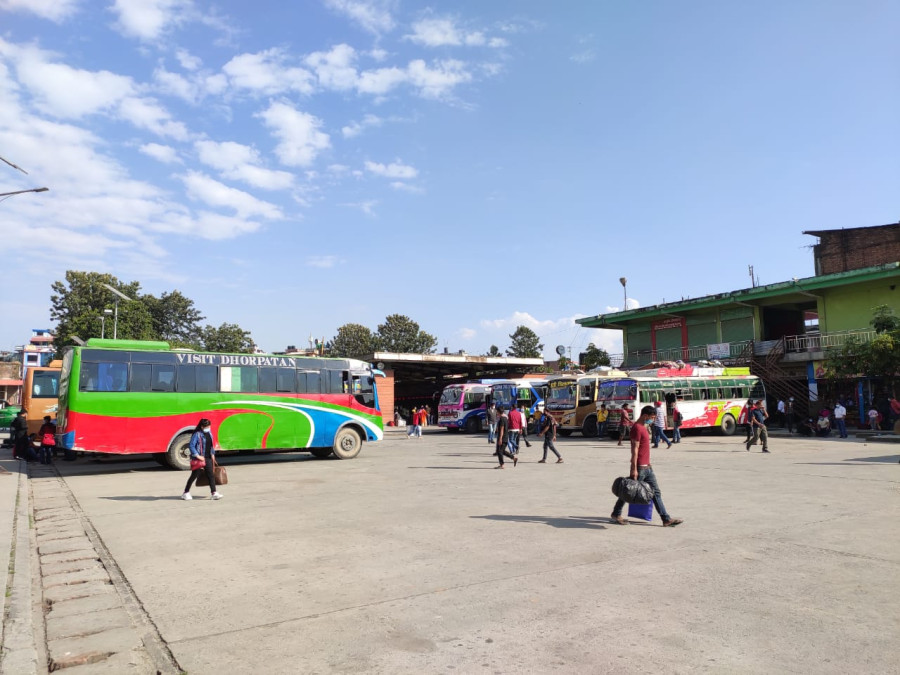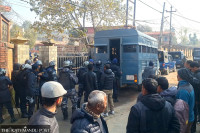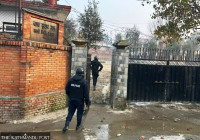Valley
Passengers leaving Valley overcharged even after fare hike reversed
There are not enough passengers to cover operation costs and fuel expenses, long haul bus operators say.
Anup Ojha
Twenty-eight-year-old Deepak Bhujel on Saturday morning spent over two hours inside the microbus he boarded to reach his hometown Pokhara. The company Pokhara Hiace had told him on Friday that the vehicle would leave at 7:30am sharp, but on Ghatasthapana, the first day of Dashain, the driver was still waiting for passengers outside New Buspark till 9:30am.
"It's because there were only three other passengers," said Bhujel, who runs a Japanese language institute in Bagbazar. He was overcharged for the bus fare. "On normal days, I would pay Rs 525, but this time I paid Rs 800," said Bhujel.
Adjacent to the Ring Road, the bus park exit had nearly two dozen microbuses in line to leave for Pokhara—all empty.
Bardan Rai, 39, owner and driver of the Hiace vehicle, said he felt no Dashain vibe this year. Fewer people travelling means he will incur losses. Rai has not hired a helper fearing that he might not be able to pay him.
In the past years, people booked tickets two weeks prior to Ghatasthapana. "But now we are runny empty, the money earned will be just enough to refuel," said Rai, who has been driving the vehicle for the last five years.
"We too have a family to look after. We have come on the road risking Covid-19 infection to earn some money as we had to stay off the road for six months due to lockdown. But this isn’t going to help," said Rai.
Manisha Saud, 33, had to wait for over an hour to board the bus leaving for Kailali from New Buspark, which wore a deserted look on Saturday. All the bus counters were open but there were very few people to buy tickets.
Since a week before Ghatasthapana, New Buspark would be filled with crowds of people, waiting in line to buy tickets or to board the bus to their hometowns for Dashain.
"I am more concerned about reaching home safely. I am equally worried about the health of my baby," said Saud, holding her three months old baby. Saud paid Rs 2,500 for the ticket which at other times costs only Rs 1,500.
Bhujel and Saud were unaware of the Cabinet's decision made last week. The government decided that bus operators would charge normal fares and carry passengers in full capacity.
Consumer rights activists, doctors and Kathmandu Valley mayors’ forum had criticised the government’s move, saying that carrying passengers without maintaining physical distance would fuel the transmission of Covid-19 among the public.
Police have yet to enforce the decision.
“We only received the government's order today [Saturday]. We will monitor the [compliance with] government’s new rules strictly from Sunday. We have started booking overcharging vehicles from Saturday itself,” said Senior Superintendent Rameshwor Yadav, spokesperson for the Metropolitan Traffic Police Division. He said 13 public transport operators on long routes were caught overcharging on Saturday.
Even when informed about the government’s revised bus fares and new announcement, passengers were unwilling to complain. “This will just make the situation more complicated, and why would I complain to the police when bus operators themselves are making losses," said Saud.
Her husband Ratan Saud, a marketing officer for a private company, who was at New Buspark to see off his wife and baby, said he was not sure of going home this Dashain.
"I am sending my wife and baby because it's risky to keep them in Kathmandu because Covid-19 has become too pervasive."
According to the Ministry of Health and Population, Saturday saw 3,167 new cases of Covid-19 across the country in the past 24 hours. Of them, 1,742 cases were reported in Kathmandu Valley: 1,451 in Kathmandu, 152 in Lalitpur and 143 in Bhaktapur districts.
"They will be staying back in my village for six months," said Ratan. "But the worry is what if the government imposes restrictions again."
Yogendra Karmacharya, chairman of the Federation of Nepalese National Transport Entrepreneurs, said hardly 300 long-route buses are leaving the Valley these days. "Almost all of them are going empty. Those leaving the Valley are making an easy trip this time because they do not have to worry about seats," said Karmacharya.
He accuses the government of puzzling bus operators with its decisions at this difficult time. "Transport operators had to keep their buses off the road for six months, now even during Dashain they are running empty," said Karmacharya.
Asked about the bus owners not reducing fares and charging passengers extra, Karmacharya said they were compelled as they are going empty even during Dashain, the time bus operators earned the most.
Transport entrepreneurs say over 5,000 public vehicles would leave the Valley daily with passengers in earlier years.
According to the Traffic Police Division, only 21,602 people left the Capital and 17,615 people entered the Valley on Friday. On Saturday, 21,000 people travelled out of the Valley.




 20.12°C Kathmandu
20.12°C Kathmandu.jpg)












